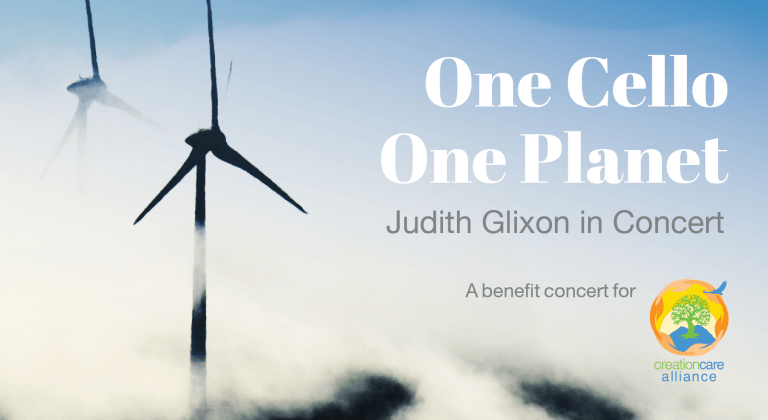Benefit Concert: One Cello, One Planet – Raleigh
Benefit Concert: One Cello, One Planet – Raleigh

Join us for One Cello, One Planet, a concert that raises awareness for creation care action. Proceeds go to support the work of the Creation Care Alliance, North Carolina Power and Light, and Interfaith Creation Care of the Triangle.
Thursday, August 08, 2019 @ 7:00 PM, Community UCC, 814 Dixie Trl, Raleigh, NC 27607
Judith Glixon, a former Asheville resident and principal cellist with the Asheville Symphony and the Brevard Chamber Orchestra, returns to NC to present a one-hour solo cello concert about the urgency of climate change. The music of J. S. Bach (Unaccompanied Suites #2 & 3), Benjamin Britten (final movement of Suite for Cello, Op.72), Maurice Ravel and a recent composition by Daniel Crawford will take listeners through an abridged history of the human race (with an emphasis on Western civilization) from its beginning until today. Ticket sales for the concert will support the work of Interfaith Creation Care of the Triangle, North Carolina Interfaith Power and Light and the Creation Care Alliance. Interfaith Creation Care of the Triangle works within and across communities of faith to urgently fulfill our sacred duty to love and protect Creation, address our changing climate and ensure justice for all life. NC Interfaith Power & Light, a program of the North Carolina Council of Churches, offers a hope-filled response to the issues of climate change. The Creation Care Alliance focuses on bringing practical and hopeful solutions to our congregations and broader secular communities by engaging hearts and minds through inspiration, education, service, and advocacy.

 Joining hosts Dayna Reggero and Marilyn Ball this month on “Speaking of Travel + Climate Listening Project Podcast” is Nakisa “Sista Sol” Glover of Sol Nation and Susannah Tuttle of NC Interfaith Power & Light!
Joining hosts Dayna Reggero and Marilyn Ball this month on “Speaking of Travel + Climate Listening Project Podcast” is Nakisa “Sista Sol” Glover of Sol Nation and Susannah Tuttle of NC Interfaith Power & Light!

 Last Saturday, NCIPL Director Susannah Tuttle and I had the opportunity to attend a conference e
Last Saturday, NCIPL Director Susannah Tuttle and I had the opportunity to attend a conference e The food that we consume as a part of the holiday season impacts the health of our climate and our communities. For this reason, we at NCIPL would like to share the following resource from the national office of Interfaith Power & Light (IPL). Many blessings as you gather with your families and friends in a spirit of gratitude!
The food that we consume as a part of the holiday season impacts the health of our climate and our communities. For this reason, we at NCIPL would like to share the following resource from the national office of Interfaith Power & Light (IPL). Many blessings as you gather with your families and friends in a spirit of gratitude!